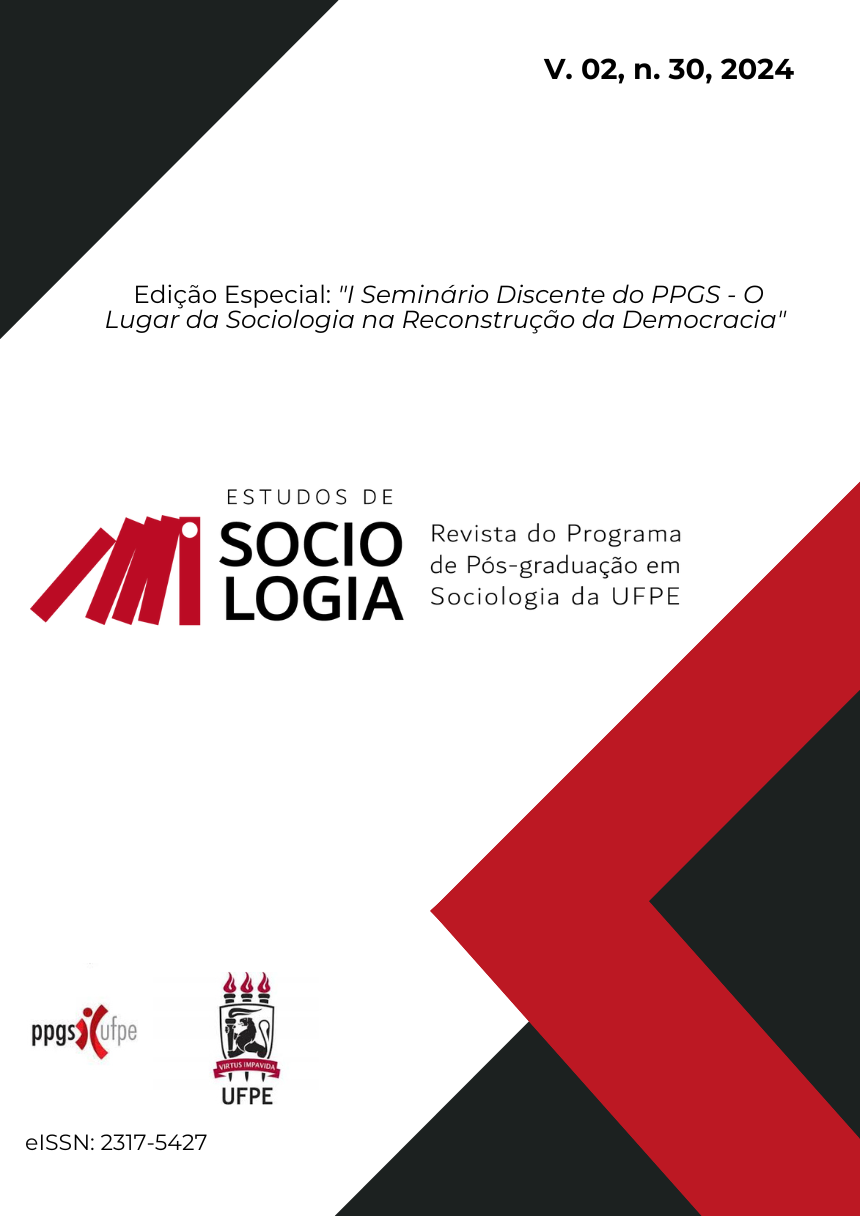The multisemioticmaking of the holder of people’s aspiration in Pernambuco’s political scenario.
DOI:
https://doi.org/10.51359/2317-5427.2024.261498Keywords:
political heritage, hope, familial power, social semiotics, multimodalityAbstract
Situated in the field of Political Sociology and Social Semiotics, this work seeks to study multimodality as a discursive strategy in texts produced for the political campaigns of candidate João Campos in the 2018 and 2020 elections. This candidate is known as the “political heir” of names famous people in Pernambuco politics, such as Miguel Arraes and Eduardo Campos. Our theoretical framework is based on studies by Bourdieu (1996, 2011a), Miguel, Marques and Machado (2015) and Monteiro (2016), for a notion of Symbolic Capital. As well as, Hodge and Kress (1988), Van Leewen (2005), Kress and Leeuwen (2006) and Newfield (2017) where understandings of what Social Semiotics, Multimodality and the concepts of semiotic system and intersemiosis are are proposed. As a methodological reference, we adopted the Analysis of Multisemiotic Discursive Strategies, proposed by Tavares (2022), to analyze the meanings represented intersemiotically between resources of the verbal and pictorial systems in the construction of the political heir carrying the legacy of hope and his supposedly historical connection with the people and its culture.
References
BOURDIEU, Pierre. Coisas ditas. Tradução Cássia R. da Silveira & Denise Moreno Pegorim. São Paulo: Brasiliense, 2004.
BOURDIEU, Pierre. O poder simbólico. Lisboa: Bertrand Brasil, 2011a.
BOURDIEU, Pierre. O campo político. In: Revista Brasileira de Ciência Política, n. 5, p. 193–216, jan. 2011b.
BOURDIEU, Pierre. O espírito de família. In: Razões práticas. Sobre a teoria da ação. Campinas: Papirus, 1996.
HALLIDAY, Michael Alexander Kirkwood; MATTHIESSEN, Christian MIM. Halliday's introduction to functional grammar. Routledge, 2013.
KRESS, Gunther; VAN LEEUWEN, Theo. Reading images: The grammar of visual design. Routledge, 2020.
LIM, Victor Fei. The Analysis of Language and Visual Images: An Integrative Multisemiotic Approach. 2002. Tese (Doutorado em Arts (English Language)). Department of English Language and Literature, National University of Sinagapore. 2002.
MIGUEL, Luis Felipe; MARQUES, Danusa; MACHADO, Carlos Augusto Mello. Capital familiar e carreira política no Brasil: gênero, partido e região nas trajetórias para a Câmara dos Deputados. In: Dados - Revista de Ciências Sociais, Rio de Janeiro, v. 58, n. 3, p. 721-747, 2015.
MONTEIRO, José Marciano. A política como negócio de família: os herdeiros e a força dos capitais no jogo político das elites da Paraíba (1985-2015). 2016. 290 f. Tese (Doutorado em Ciências Sociais). Programa de Pós-graduação em Ciências Sociais. Centro de Humanidades. Universidade Federal de Campina Grande. Campina Grande - PB, Brasil, 2016.
SCHWARCZ, Lilia Moritz. Sobre o autoritarismo brasileiro. São Paulo: Companhia das Letras, 2019.
TAVARES, Douglas da Silva. Estratégias Discursivas diante do Desafio de Ensinar Teoria e Prática em Cursos Técnicos não Presenciais. Tese de Doutorado. Faculdade de Letras. Universidade de Lisboa. Lisboa, Portugal, 2022.
VAN LEEUWEN, Theo. Introducing Social Semiotics. 2005.
Published
Issue
Section
License
Copyright (c) 2024 Gustavo Leonardo Silva, Douglas Tavares

This work is licensed under a Creative Commons Attribution 4.0 International License.
Autores que publicam nesta revista concordam com os seguintes termos:- Autores mantém os direitos autorais e concedem à revista o direito de primeira publicação, com o trabalho simultaneamente licenciado sob a Licença Creative Commons Attribution que permite o compartilhamento do trabalho com reconhecimento da autoria e publicação inicial nesta revista.
- Autores têm autorização para assumir contratos adicionais separadamente, para distribuição não-exclusiva da versão do trabalho publicada nesta revista (ex.: publicar em repositório institucional ou como capítulo de livro), com reconhecimento de autoria e publicação inicial nesta revista.
- Autores têm permissão e são estimulados a publicar e distribuir seu trabalho online (ex.: em repositórios institucionais ou na sua página pessoal) a qualquer ponto antes ou durante o processo editorial, já que isso pode gerar alterações produtivas, bem como aumentar o impacto e a citação do trabalho publicado










